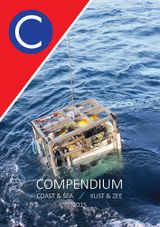|
|
| Line 34: |
Line 34: |
| | |} | | |} |
| | |} | | |} |
| − | {{#categorytree:Coastal and marine system|mode=pages|onlyroot=on|style=clear:right; margin-left:1ex; border:1px solid gray; padding:0.7ex; vertical-align:right; background-color:#f5faff;}} | + | {{#categorytree:Coastal and marine system|mode=pages|onlyroot=on|style=border:1px solid gray; padding:0.7ex; vertical-align:right; background-color:#f5faff;}} |
| | <br> | | <br> |
| | '''Welcome to the Coastal Wiki, your guide to coastal knowledge and experience'''<br> | | '''Welcome to the Coastal Wiki, your guide to coastal knowledge and experience'''<br> |
Revision as of 17:01, 17 December 2007
This weeks featured article
|
|
Compendium for Coast and Sea - creating a marine science-policy interface
The Compendium for Coast and Sea is an integrated knowledge document about the socio-economic, environmental and institutional aspects of the coast and sea in Flanders and Belgium. As such, it constitutes a one-stop shop for data and information from the Flemish and Belgian marine and maritime research community and experts. The Compendium for Coast and Sea is an initiative of the Flanders Marine Institute (VLIZ) and was developed in close collaboration with experts from the research community, government, industry and civil society organisations. The first version of the Compendium was launched in 2013, a second edition was presented in 2015.
More..
|
|
|
|
|
Category Coastal and marine system not found
Welcome to the Coastal Wiki, your guide to coastal knowledge and experience
You may find information on any coastal topic by entering a corresponding term in the search window. “Go” will direct you to an article with this title (if such an article exists); “Search” will provide an overview of articles in which your search term appears. You will find an explanation of coastal terms and concepts in the Glossary.
We also invite coastal and marine practitioners, policymakers and scientists to make a contribution to this new concept in sharing European knowledge and experience in integrated coastal zone management. You may contribute in several ways: you may improve or update an existing article, you may add a discussion page to an existing article or you may add a new topic.
How to contribute to the Coastal Wiki
You have unrestricted access to the Coastal Wiki. But for adding or editing articles an authorisation is required. This is a major difference with the general wikipedia. For obtaining an editing authorisation you may contact your national coordination office or you may simply send an email to info@encora.eu. You will receive a request to provide contact information for the Wiki Contact Database. Anonymous contributions to the Coastal Wiki are precluded. Authors, co-authors and editors of articles are explicitly acknowledged. Your contribution will be reviewed by the coordinator of the theme where your article best fits. The theme coordinators also check that your contribution is adequately linked to existing articles on similar or related topics.
You should remember that the Coastal Wiki is primarily meant for disseminating knowledge to a broader audience than the circles of specialists working at the frontiers of science. It is not meant for publishing original research; it is a vehicle for disseminating knowledge complementary to the traditional peer-reviewed scientific journals. Please read the Coastal Wiki Rules and Excellent article before you start writing an article.
| Encora Themes
|
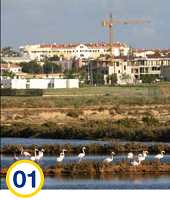 |
Theme 1 - Social and economic aspects of ICZM Multifunctionality and Valuation.
Valuation of competing functions to optimise the societal use of coastal and marine resources.
|
|
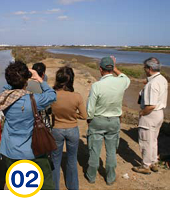 |
Theme 2 - ICZM Participation and Implementation.
Testing and improving methods to evaluate progress in the implementation of ICZM, including eGovernance.
|
|
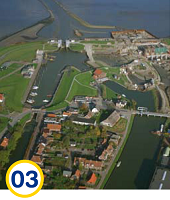 |
Theme 3 - Coastal and marine spatial planning.
Multiple-scale structuring of spatial coastal and marine planning and related decision-support systems for sustainable development.
|
|
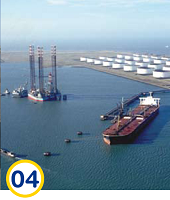 |
Theme 4 - Pollution, prevention and mitigation.
Development and application of emerging methodologies for preventing, detecting and mitigating pollution and for identification of areas at risk.
|
|
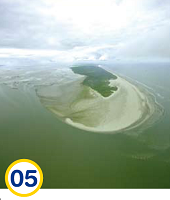 |
Theme 5 - Long-term geomorphologic change and climate impacts.
Promoting development, demonstration & dissemination of new and emerging models & methodologies for prediction of changes to coastal systems.
|
|
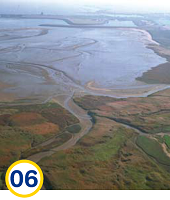 |
Theme 6 - Effect of development and use on eco-morphology and coastal habitats.
Impact-assessment tools and environmental techniques for recovery of coastal habitats.
|
|
|
|
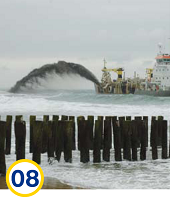 |
Theme 8 - New sustainable coastal engineering techniques.
Cataloguing innovative coastal engineering techniques to solve practical coastal protection issues.
|
|
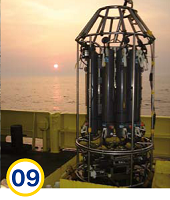 |
Theme 9 - Assessment of field observation techniques.
New and emerging tools and practices for coastal and marine observation, with focus on remote sensing and remotely controlled measuring devices.
|
|
 |
Theme 10 - Capacity Building, Training and Education.
Comparative assessment of ICZM training and education programmes.
|
|
